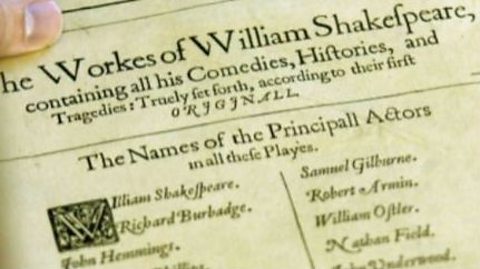Unlocking the Dream
In William Shakespeare's fantasy masterpiece A Midsummer Night's Dream, the mischievous sprite Puck concocts a magical potion to make people fall in love.
Shakespeare had no need for such alchemy. His plays were adored by all, from the nobility at the royal court to everyman audiences in the Globe Theatre, and have brought joy to many more through the ages.
And yet many people nowadays find the Elizabethan-era language and obscure references hard to decipher. So how do you fall in love with Shakespeare today?
'They're the greatest texts in the world'
Russell T Davies, who has adapted A Midsummer Night's Dream for ΒιΆΉΤΌΕΔ One, explains how Shakespeare's plays and poems will always be reworked for the modern age.
Russell T Davies (centre, right) with director David Kerr on the set of A Midsummer Night's Dream.
Man out of time
Like todayβs soap operas, Shakespeareβs plays featured characters and language that were, in their time, everyday, relatable and topical.
He poked fun at figures of the establishment, referenced current affairs and used the latest words and slang of the day. Many of these terms are still in use today, but a good proportion feel unfamiliar to modern audiences.
Directing the drama
βShakespeareβs language is very dense, so youβve got to unpack the density of those lines in a way that will make sense of them to a modern audience," says David Kerr, director of A Midsummer Night's Dream.
"If youβve lost the audience it doesnβt matter how amazing the set piece is, the beautiful costumes, the incredible sets and visual effects. None of that matters. People have to understand whatβs going on with the characters."
Voice coach Lyn Darnley reveals some of the methods actors can use to get under the skin of Shakespeare.
Owning the characters
Click or tap on the hand to watch the stars of the ΒιΆΉΤΌΕΔβs A Midsummer Night's Dream explain how they overcame challenges with Elizabethan dialogue and grew to love performing Shakespeare.
A sea-change into something rich and strange
If you find that plays and poems donβt quite fit the bill, fear not! You neednβt be barred from the Bard.
The obvious place to start is cinema. Films as diverse as The Lion King, Gladiator and the Bollywood movie Haider were all inspired by Hamlet, while 10 Things I Hate About You was a modernisation of The Taming of the Shrew.
Hip-hop is a world apart from Shakespeare, right? Not so, says acclaimed lyricist Akala, who founded The Hip-hop Shakespeare Company to combine the Bardβs writing and writing bars.
Comics and cartoons
Cartoonist Ryan North also took a novel approach to Shakespeare. His choose-your-own-adventure version of Hamlet, To Be Or Not To Be, broke funding records when it launched on Kickstarter.
Northβs book allows readers to play as Hamlet, his ghostly father or Ophelia as they follow a multitude of story branches, ranging from the original plot to oceanic exploration and dinosaur taming.
But if that sounds complicated, try Mya Goslingβs webcomic Good Tickle Brain instead. She reduces each of Shakespeareβs plays to just three panels.
Learn more about this topic:
How has Shakespeare influenced us? document
A 60-second animation that examines how the words Shakespeare used, and the films based on his work, continue to influence us today.

Why was Shakespeare so special? document
Michael Rosen explores the work of William Shakespeare and his fellow playwrights, and looks at why his plays in particular have stood the test of time.

Why is the Bard so popular abroad? document
Looking at Shakespeareβs popularity abroad. How far have his plays reached and how are they used by different cultures?
